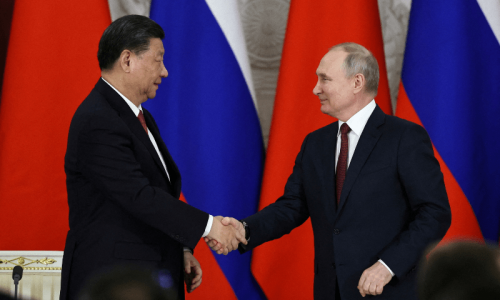 LONDON: There is no more ominously evocative symbol of communal conflict in the sub-continent than the corpse-packed train. Scenes like that in Godhra, in Gujarat, this week were typical of partition days, as millions fled violence in their home areas only to suffer it again as the trains supposedly carrying them to safety were intercepted. The train under these circumstances is an awful instrument of worst impulses. It can deliver a mass of victims of one sect or ethnicity into the hands of predators from an opposing group in circumstances in which the first has no protection and the second can often act with total impunity.
LONDON: There is no more ominously evocative symbol of communal conflict in the sub-continent than the corpse-packed train. Scenes like that in Godhra, in Gujarat, this week were typical of partition days, as millions fled violence in their home areas only to suffer it again as the trains supposedly carrying them to safety were intercepted. The train under these circumstances is an awful instrument of worst impulses. It can deliver a mass of victims of one sect or ethnicity into the hands of predators from an opposing group in circumstances in which the first has no protection and the second can often act with total impunity.
Communal violence in India, as the radical journalist and academic Aijaz Ahmad has pointed out, has increased rather than diminished in every decade since the relatively trouble free period which followed partition. Even though the great troubles were fading in memory, the index of communal killings kept on creeping up.
Not least in Gujarat, where the 1969 riots killed more than 1,000 people, and where there was serious violence in 1986 and again in the 1990s, when Christians as well as Muslims were targets.
This week’s Muslim attack on Hindus has to be seen against that regional background and history as well as in the larger national context. The victims “were not going for a benign assembly”, Teesta Setalvad, the head of an anticommunalism group, told the Washington Post. “They were indulging in blatant and unlawful mobilization to build a temple and deliberately provoke the Muslims in India.”
The Hindu nationalist groups (campaigning for the building of a temple on the site of the mosque demolished in Ayodhya in 1992 by mobs) have, in recent weeks, begun camping there; they have heaped up building materials and specially carved pillars for the reconstruction of the temple which the mosque centuries ago displaced.
“Volunteers” from all over India have been going back and forth to Ayodhya in an attempt to bring pressure to bear on the prevaricating coalition government in Delhi to permit the work to begin, even though the courts are still weighing the issue.
That government is led by the same Bharatiya Janata party whose members and associates were prominent in the destruction of the mosque. But the BJP, shaky after a series of election defeats and facing the difficult consequences in office of what it wrought in opposition, twists in agonised fashion between appeasing its own more extreme supporters and trying to keep the lid on what could become much more widespread violence.
Everybody remembers that more than 2,000 people died in religious riots across the country after the Babri Masjid mosque was destroyed. The Godhra killings have already led to more deaths, and only the curfews swiftly put in place in 26 cities may have prevented others. The prime minister, Atal Bihari Vajpayee, is sufficiently concerned to have cancelled his trip to Australia to attend the Commonwealth summit.
Murder of the ethnic and sectarian riots kind is a message about dominance, the political scientist Donald L Horowitz argues, about asserting it or resisting it, a fearful dialogue about who shall prevail.
He examines the combination of cowardice and cruelty which characterises such attacks. Those who kill rarely take real risks either in the form of retaliation from intended victims or interference from the authorities.
Given that many riots and attacks are sudden affairs, they pick with usually uncanny skill a time and place which offers maximum advantage. The riot or attack of this kind is not something which can be understood as “a one-time event”. The attackers see the episode as part of a long chain of provocation, threat, and crime against their community. —Dawn/The Guardian News Service.











































Dear visitor, the comments section is undergoing an overhaul and will return soon.